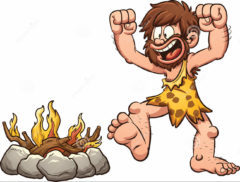Who am I? is a question that we have posed and thought over for some time. Some more than others, especially more often than most when things go askew or just on a philosophical plane after a drink or smoke or two. But on a serious note when we consider our immortality and fragility we tend to always ask “Who Am I” either in relation to ‘who does all this things’ or ‘this things happen to’. “Who am I?” Am I a soul trapped in a bag of skin and bones or am I none of it, Am “I” the soul or soul and the body.
If I was to ask anyone on the street who they were I would most certainly be given a name, a title or a gender –we say I am ‘Sam’, or I am a ‘teacher’, or I am a father/mother, or I am a man or woman. But, which are you really? I personally can answer to a few labels depending on what I was addressing; at home I am a father, a husband. On the street I am a man of a certain complexion color and height , in the office I am a work colleague, with a certain office, a manager, director or a CEO or a professional, a teacher, an actor, a dancer, to my parents a son, to my grandmother a grandson to my friends just Sam. And I behave and present personalities to each the labels to every person I communicate with in the expected persona. So if all the above are my labels, then which of them is ‘Me’ when am I really me?
Do I have a ‘self’ or just multiple of personas? The word ‘person’ after all is derived from the Latin word “persona,” which referred to a mask actors wore on stage plays. Do I then have many masks, many personas that I have no self? If I just pretend to be someone befitting any title/mask, then who is doing the pretending? Could it be there is no one pretending, because when I am a ‘son’ I believe it to be so, when I answer to Dad, I believe again I am ‘Dad’. Could I be a void behind a mask waiting to be defined by a circumstance? I just don’t know.
To quote William Shakespeare in ‘As you like it’
“All the world’s a stage,
And all the men and women merely players.
They have their exits and their entrances,
And one man in his time plays many parts..”
Noticing how we use language, we say “ I am”, “Do I”,“I have”, “I think” , we present an “I” that is owning all the body has, we even say “My body” a dualism of self and body is created and we all seem to accept it as the correct framing. When someone dies we recognize that the “I” is separated, we say “the body of” just as we would when referring to his jacket, shoe or hat!. It all gets so confusing when trying to discover the “I”.
Maybe we should first establish what “I am” is not, we have already accepted that my body i.e. blood, flesh, fat, nerves, marrow and bone is not the “I” because as we say “my body”, we infer an owner of the body. We also know that our senses through our ears, skin, eyes, tongue and nose and all we perceive through them i.e. sound, touch, form, taste and smell, are also not ‘I’. So having eliminated everything mentioned above as not ‘I’, the ‘I’, is found to stand alone in solitude, in a knowledge of ‘I am’ . this knowledge is only found in a ‘consciousness’ that resides everywhere and no where within the body.
But is ‘consciousness’ a thought and Is the “I” then just a thought? And if it is have I been a thought all along? Using this argument we run into trouble because we have to ask, if it is a thought, who is thinking the thought? There must be a thinker of the thought! I cannot then be a thought; I must be the thinker behind every thought because I offer the thoughts, I say “my thought are” “ I think”. So who is this thinker that I am? If we try to look at the origin of a thought we find it also very elusive. If I ask you “what are you doing this evening?” A thought springs to mind, but before I asked you that question, where was that thought you furnished? My question could be from a topic from the past, present or future and the process of springing forth a thought to the question is always the same. The question “what did you have for lunch yesterday” can be from a memory but “what will you have for dinner tonight”, cannot be as it has not happened, the thought cannot come from a memory bank somewhere from hence you draw it and offer to the question, like reading from a book, it would be easy to answer already done actions but an anticipated actions led question would be difficult as it is not yet in the ‘book’. Yet the thought is easily generated in the same manner.
So, where do thoughts come from must be answered from a thinker. A thinker that I most t importantly think “I am” the ‘Thinker’ of all “My” thoughts.
To find the ‘Thinker’ we need to dig deep and find ‘what’ or ‘who’ is the‘Thinker’ -This will be addressed in the next blog next week as we continue to find “WHO AM I”
Until then I leave you with
T.S. Eliot’s ‘The Elder Statesman’, where a character says:
I’ve been freed from the self that pretends to be someone
And in becoming no one, I begin to live.

